|
Book Reviews
Click on book cover to return to top
|
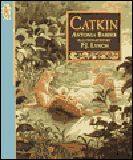 |
Catkin,
written by Antonia Barber, illus. by P. J. Lynch, (Candlewick Press,
1994), 48p, Ages 7-11.
Catkin is a tiny, magical, golden cat who is given the job of watching
over a little girl. When he carelessly allows her to be captured by
the Little People, Catkin must solve three riddles to return the child
to her parents. With undiscovered courage, Catkin makes his way through
the forest to the palace of the Little People and discovers that they
also love little Carrie. It takes the wisdom of an old woman to teach
two families the meaning of sharing. |
|
Cloudy
With a Chance of Meatballs,
written by Judi Barrett, illus. by Ron Barrett, (Antheneum Books
for Young Readers, 1978), 32p, Ages 4-8.
In the town of Chewandwallow food comes down three times a day, at
breakfast, lunch and dinner. When the weather takes a turn for the
worse, the townsfolk experience a strange mixture of foods, in not
only quality but also quantity. |
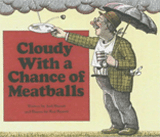 |
|
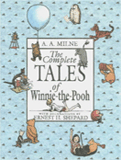 |
The
Complete Tales of Winnie-the-Pooh,
written by A. A. Milne, illus. by Ernest H. Shephard, (Dutton Children's
Books, 1994), 344p, All Ages.
Perhaps the best-known bear in history, Winnie-the-Pooh is as popular
today as he was when he was created in 1926. This edition contains
two books about Pooh, Piglet, Rabbit, Eeyore, Christopher Robin and
all the other characters found in the Hundred Acre Wood. Simple and
whimsical, the characters and tales from Winnie-the-Pooh and The House
at Pooh Corner will capture any child's heart, and children
will forever remember the rather stout, honey-loving bear. |
|
Curious
George, written & illus.
by H. A. Rey, (Houghton Mifflin, 1941), 56p, Ages 5-8.
In children's literature, George is probably the most famous
monkey of all time and his adventures have delighted children and
adults for decades. Taken from the jungle by "the man in the
yellow hat" George arrives in the big city, but due to an insatiable
curiosity trouble is never far away. Throughout every adventure, George
never loses his curiosity or reforms, but the man in the yellow hat
is always ready to forgive |
 |
|
 |
Dinosaur
Bob and His Adventures with the Lizardo Family,
written & illus. by William Joyce, (HarperCollins Publishers,
1988), 48p. Ages 4-8.
While vacationing in Africa, the Lazardo family meets a dinosaur and
brings him home to become their family pet. His back is perfect for
conga dancing, he makes a good ship and even plays a decent game of
baseball. Any misgivings soon change when Bob helps the Pimlico Pirates
win their first game. |
|
Ira
Sleeps Over, written & illus.
by Bernard Waber, (Houghton Mifflin Children's Books, 1972), 48p,
Ages 5-10.
Ira is looking forward to spending the night at a friend's house until
his sister brings up the matter of his teddy bear. Leaving his beloved
teddy behind is difficult, but the thought of being laughed at for
still needing one causes Ira to leave Tah Tah behind. At bedtime that
night, creepy, scary ghost stories make both boys realize there's
nothing laughable about having your teddy close by. |
 |
|
 |
June
29, 1999, written & illus.
by David Wiesner, (Clarion Books, 1992), 32p, Ages 6-9.
Holly decides on a very ambitious science project for her third grade
class project. On May 11, 1999, she sends her vegetable seedlings
into space. No one is prepared for the huge vegetables that begin
to fall from the sky. Even stranger is the fact that her vegetables
are not the ones coming down. |
|
The
Kitchen Knight: A Tale of King Arthur,
retold by Margaret Hodges, illus. by Trina Schart Hyman (Holiday
House, 1990), 32p, Ages 5-8.
This story is a retelling of one of the most exciting and entertaining
of the King Arthur and his knights tales. A young boy asks to spend
a year in the kitchen of King Arthur while learning to become a knight.
After many battles, Gareth eventually earns knighthood and rescues
Lady Linesse who is imprisoned by the fearsome Red Knight of the Red
Plain. |
 |
|
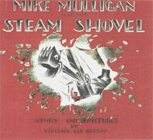 |
Mike
Mulligan and His Steam Shovel,
written & illus.
by Virginia Lee Burton, (Houghton Mifflin &
Co., 1939),
48p, Ages 3-7.
Mary Anne, a red steam shovel, and her loyal operator, Mike Mulligan,
were famous for digging, but are no longer needed. When the town of
Popperville wants a new town hall, Mike and Mary Anne prove their
worth in the hectic digging of a cellar in one day. Of course, they
forgot to dig a way out, but there's a great ending to this
dilemma. |
|
Puss
In Boots, written by Charles
Perrault, retold by Lincoln Kirstein, illus. by Alain Vale, (Little,
Brown & Co., 1992),
32p ,Ages 5-9.
First published in 1697, a very clever cat uses unorthodox methods
to help his young master gain a fortune and the hand of the king's
daughter. Wearing a beautiful pair of boots, Puss has his work cut
out for him as he outwits a king and an ogre to gain his master the
title of Marquis of Carabas. The young man is rewarded with a fortune
and a princess while puss is rewarded with the title of Prime Minister. |
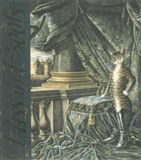 |
|
 |
Snow
White, written by the Grimm Brothers,
illus. by Charles Santore, (Park Lane Press, 1996), 48p, Ages 5-8.
This fairy tale tells of a young princess and her flight from an evil
queen, friendship with seven dwarfs
whose cottage she takes sanctuary in, and the prince who rescues her
from death. This version is more true to the original Grimm Brothers
tale than the animated film version, especially the demise of the
evil queen. |
|
The
Story of Little Babaji, written
by Helen Bannerman, illus. by Fred Marcellino, (HarperCollins Publishers,
1996),
32p, Ages 4-8.
None of the controversy that surrounded the original written as
Little Black Sambo (1899) is contained in this edition. A little
boy from India meets several ferocious tigers in the jungle and
decides to trade his new clothes for his life. The tigers argue
over who is the grandest, begin to fight and eventually turn into
melted butter. |
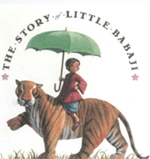 |
|
 |
Thumbelina,
written by Hans Christian Anderson, retold by Erik Haugaard, illus.
by Arlene Graston, (Delacorte Press, 1997), 32p, Ages 5-8.
Once there was a tiny girl, no bigger than a thumb, who was kidnapped
by an ugly old toad. In this unabridged translation, Thumbelina experiences
many adventures, some dangerous, before discovering a fairy price
just her size. As in most fairy tales, good triumphs over evil, always
with a happy ending. |
|
The
Wizard of Oz, written by L. Frank
Baum, illus. by Charles Santore, (Random House, 2000), 96p, Ages
6+.
Since this tale first appeared in 1900, it has been one of the most
translated stories in American history. A cyclone transports Dorothy
and her dog from Kansas to the land of Oz. with the help of three
faithful friends, Dorothy must find the great wizard in order to return
home. Santore's interpretation has been condensed from the original
text, but for young children it is a visual delight. |
 |
|

